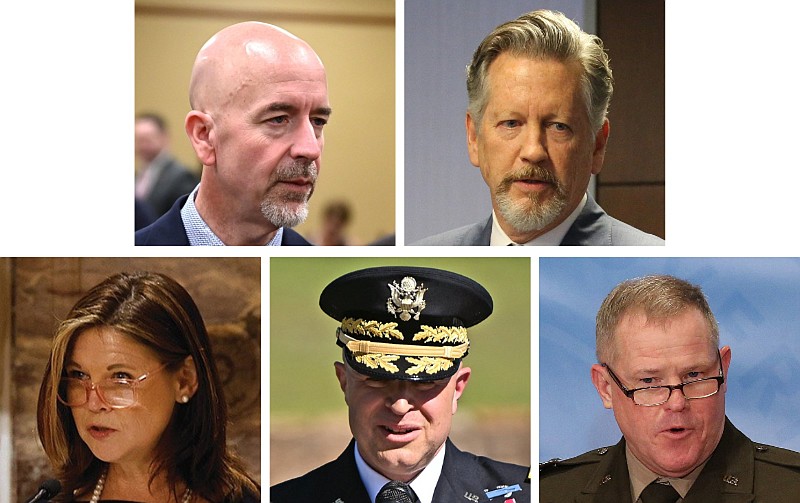The Arkansas Legislature's Joint Budget Committee on Thursday signed off on Gov. Sarah Huckabee Sanders' request to grant 2% merit pay raises to the secretaries of the state departments of commerce, education, human services, military and veteran affairs and the Governor's Mansion administrator and exceed their maximum-authorized salaries.
Without any debate, the committee voted to follow its personnel subcommittee's recommendation Wednesday to approve the Republican governor's request.
The budget committee's action means the annual salary for state Education Secretary Jacob Oliva will increase from $250,000 to $255,000, and means the salaries of state Commerce Secretary Hugh McDonald and state Human Services Secretary Kristi Putnam to increase from $225,000 to $229,500, according to the state Office of Personnel Management.
The committee's action also means the annual salary for Military Department Secretary Jon Stubbs will increase from $205,420 to $209,528, for Veterans Affairs Secretary Kendall Penn from $201,290 to $205,316, and for Governor's Mansion Administrator Mary Ashleigh Harper from $125,985 to $128,504.
The governor has awarded 2% merit pay raises to all 15 Cabinet secretaries and the Governor's Mansion administrator, and these agencies have the funds to cover the raises, Office of Personnel Management Director Kay Barnhill told state lawmakers Wednesday. The cost of the merit pay raises is $59,000, said Tony Robinson, personnel review administrator for the Bureau of Legislative Research.
Evaluations have been completed for all 15 Cabinet secretaries and the Governor's Mansion administrator, and a decision to provide merit raises to them has been made, Barnhill said in a letter dated Wednesday to the personnel subcommittee co-chairs Sen. Breanne Davis, R-Russellville, and Rep. Jim Wooten, R-Beebe.
"The incumbents in these positions have not received a raise since their appointment by the Governor and will not receive merit raises in July of 2024," she wrote in her letter.
The 2% merit pay raises will increase the annual salaries of state Health Secretary Renee Mallory from $191,809 to $195,645, state Public Safety Secretary Mike Hagar from $185,000 to $188,700, state Finance and Administration Secretary Jim Hudson from $180,000 to $183,600, state Parks, Heritage and Tourism Secretary Shea Lewis from $175,000 to $178,500, and state Labor and Licensing Secretary Daryl Bassett from $171,127 to $174,550, according to the Office of Personnel Management.
The 2% merit raises also will increase the annual salaries of state Agriculture Secretary Wes Ward, state Corrections Secretary Lindsay Wallace, state Energy and Environment Secretary Shane Khoury, state Transformation and Shared Services Secretary Leslie Fisken and state Department of Inspector General Secretary Allison Bragg from $167,096 to $170,438, according to the Office of Personnel Management.
Alex Johnston, chief of staff for the Department of Transformation and Shared Services, said late Thursday afternoon these merit raises will become effective Sunday.
Barnhill told lawmakers on Wednesday that other state employees will be eligible for a merit pay raise in July.
State employees who meet or exceed expectations during their performance evaluation will be eligible for merit pay raises, and the governor will decide on the percentage of merit pay raises near the end of fiscal 2024 that ends June 30, she said.
All state employees, including Cabinet secretaries, will be eligible for an up to 3% "market adjustment" pay raise under the governor's proposed pay plan in July, but the governor has not announced that percentage yet, Barnhill said.
The state's executive branch has 22,509 employees with an average salary of $50,762.45 a year, Johnston said earlier this month.
Davis on Wednesday introduced Sanders' temporary state employee salary plan as Senate Bill 77. The bill is in the Joint Budget Committee, according to the General Assembly's website.
Under the legislation, a state employee under the Uniform Classification and Compensation Act may receive "a market adjustment" to his or her base salary that may not exceed 3% of the employee's base salary and the employee shall not receive more than one market adjustment. This part of the bill would become effective on or after July 1, 2024, and expire on June 30, 2025.
SB77 also would increase the minimum annual salary for state employees to $32,405 a year, raise the maximum salary range for all pay grades by 10%, and authorize new incentives for future recruits and current employees who go above and beyond, either through a lump sum payment or through extra hours of paid leave.
Sanders has signaled that she hopes to overhaul the state employee pay plan in its entirety during the 2025 regular session.
In March of 2023, the governor announced she wouldn't support a broad-based pay plan increase in the state government's employee classification and compensation bill with an $80 million price tag that doesn't consider the strategic needs in education, public safety, health care and corrections.
In June of 2023, Sanders authorized merit pay raises for what she called exceptional employees in the executive branch agencies in a move that the transformation department said meant about 5,760 of the state's more than 22,000 executive branch employees received merit raises, effective July 9, 2023, with a total cost of $16.3 million, including $6 million in state general revenue. Sanders' plan led to some state employees grumbling to state lawmakers about the merit raises authorized by the governor.
In February, Arkansas Legislative Council signed off on the state Department of Transformation and Shared Service's consulting contract for up to $5.5 million to help the state's 15 executive branch agencies become more efficient and improve services to Washington, D.C.-based McKinsey & Co.
"Our priority within this is for the pay plan and the merit evaluation system for a recommendation to come to us by June 1," Fisken told lawmakers in February.
State government last overhauled its pay plan in 2017 under then-Gov. Asa Hutchinson. That plan was projected to cover 25,000 full-time state workers and cost about $57 million to implement in fiscal 2018, including about $24 million from general revenue, with the remainder coming from other revenue sources.
